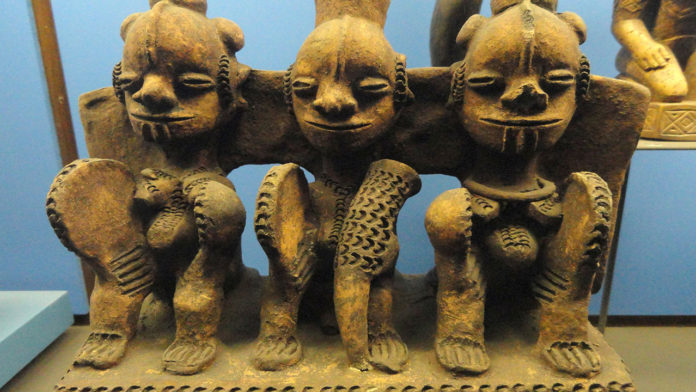- Insights Into His Stubbornness, Resilience & Attitude Towards Overbearing Human Authorities…
By Anayo M. Nwosu
A natural Igbo man is a born rebel even to his own God. The stubbornness of the Igbos to their various deities and to even the Christian God is very legendary if not more defiant than any race I can think of.
Igbos continuous worship of a deity or a supernatural force is based on the deity’s performance and not entirely out of fear.
Therefore, it’s a common saying in Igbo that “Arụsị nyebe nsogbo egosi ya osisi ejiri pịa ya” meaning that “if a deity becomes unreasonable, it will be shown the wood from which its symbol was carved”.
It is a common practice in Igboland to “dis-God” a deity by a general consensus or acclamation in a properly constituted meeting of all the village heads or kindred.
Once a sentence of “no more worship” or “sack” is passed on a deity in a general meeting of the worshippers, the shrine of the dis-goded deity is destroyed and the deity is expected to take a flight and leave the community.
The same goes for the evil forest owned by powerful deities.
Nnewi people capture this by a saying that “ọ bụ mmadụ sịrị Edo nwelu Nkwọ” meaning ” that Edo deity owns Nkwọ market land and the adjoining thick forest was because it was so decided and dedicated by human beings” and that the same citizens could as well repossess their property from the deity if they so wish.
Edo is the supreme deity of Nnewi people.
The power of Igbos in abridging the influence of their gods was proven in the 1980s at Nnewi when the town agreed to clear the dreaded Edo thick forest to build the Agbọ Edo International Market.
The initial attempts by the state government’s contractors to clear the forest were resisted and frustrated by the deity as powerful snakes, bees and mysterious birds openly chased the workers away even with their earthmoving equipment. They were too hasty.
It wasn’t until all the Ndị Isiobi (or village heads) led by the traditional ruler of the town, Igwe KON Orizu, assembled at the precinct of forest and announced to the deity, the decision of Nnewi people to repossess their land, that the clearing of the forest became possible.
The Igwe symbolically felled a shrub and the other village heads of Ụshuagụ, Ụmụdim and Nnewichi followed suit, one after the other. By this singular act, the supreme deity had been subdued. She had to comply. After all, she was not being sacked.
The contractor who was asked to commence clearing after this common ritual was surprised that none of those dangerous animals or spiritual soldiers opposed or harmed their workers until the entire evil forest was cleared and a modern market erected.
There is a long list of many deities in Igbo land sacked for either demanding more expensive sacrifices or acting against the interests of the general populace or their worshippers.
It is noteworthy that no one person, not even the chief priest of a deity can summarily sack or de-god a community deity. There must be a consensus otherwise a unilateral action without general support is severely punished by the deity itself.
Many ignorant converts of new religions have gone mad or their children seriously afflicted with misfortunes because they single-handedly destroyed shrines of their community gods or appropriated property belonging to a deity without first securing the permission of the entire family or community members.
No amụful Igbo man or one that suckled his mother’s breasts will kill or would fight a war or shed blood to secure converts for any God. The Igbos wonder how a deity, God, or Allah would expect mere humans to help it punish its enemies. Such abdication of duty by a supreme being is incomprehensible to an Igbo man or woman.
In Igbo land, a deity that worths its reverence or worship demonstrates its ability to fight its own battle.
An Nnewi man would ask “ewulu isi m chụọ àjà ka ana dị mma, agam esozikwo lite ya ulu” meaning that “if my head is used for appeasement sacrifice, does it make sense as I won’t be alive to benefit?”
The tested power to strike dead (as Amadiọha deity has) or the power to cause a bloating stomach of offenders (as Udo deity does) are the marketing tools employed by the deities to awe their worshippers.
It is by afflicting miserable diseases and misfortunes on enemies and showing instant justice to innocent supplicants that the obeisance, trust, and greater worship are obtained from Igbo followers of a spiritual being.
Igbos believe that the job of a drummer should be separated from that of a dancer. Hence, Igbos would never obey an instruction from any deity that asks them to beat the drums and at the same time expect them to do the dancing. A god should fight its own fight.
For an Igbo, it smacks of a high fraud for a spiritual being to recruit them to kill and coerce unbelievers to worship it when simple miracles or signs and wonders which should be hallmarks of such a deity, Allah or God, can do the job.
If an Igbo man must kill a fellow human being, it has to be for an earthly gain or an instant reward, not a reward that would be received hereafter.
This is the belief of the Igbos; the very same reason why they fear no human authority just like they can and fearlessly disinherit, banish and even sack their own gods.
You can now see how dangerous a road it is for some other Nigerians who work and interact with Igbos and who attempt to play God in their careers and lives. It is a matter of time before that Igbo will de-god you.
[email protected]
Ikenga Ezenwegbu Nnewi





